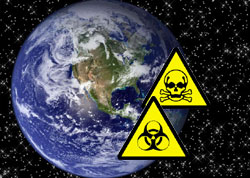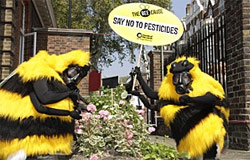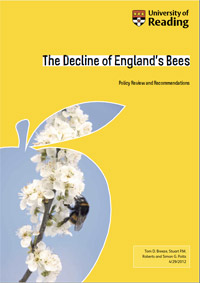 |
 |
|
British Bees Under Threat From Pesticides Says Friends Of The Earth
One of the worst pesticides which are causing mayhem to Bees, destroying their habitat, resulting in reduction to the Bee population and as a result, harming honey production and the economic lives of those farming Bees. Bees in the UK are declining at a worrying rate. Here are some basic facts: ■ Two bumblebee species have become extinct. We need bees to pollinate many important food crops, including most fruit and vegetables. Bee pollinated crops are important sources of vitamins A and C, and minerals like calcium. By pollinating attractive wildflowers like bluebells and poppies, bees also help support the natural environment that people love – benefiting us culturally and economically, as well as ecologically. Some of the food pollinated by bees: * Strawberries * Broad beans * Basil * Blueberries * Coriander * Raspberries * Cucumber * Apples * Pumpkin * Squash * Tomatoes * Aubergine The price of many fruits and vegetables would go up without bees, and the price of British apples could double.
There is increasing evidence that insecticides – particularly some of the neonicotinoid based products – are affecting bee health and, combined with other pressures, may be killing bees. Solitary bees – which make up the vast majority of British bees – may be particularly vulnerable to the effects of pesticides. We urgently need a National Bee Action Plan to reverse bee decline. Friends of the Earth has produced a summary report of the main findings and recommendations from research by the University of Reading, carried out for Friends of the Earth in 2012. This is available from the E-Library Database by clicking on the pic below. In March of this year, the Government ignored scientific evidence and independent experts. It failed to back a two year ban on the three neonicotinoid pesticides most dangerous to bees. Now a leading group of cross-party MPs has told the Government to change its position and overhaul its pesticides policy. In particular, the Committee unanimously backed European proposals for a temporary ban on the use of three neonicotinoid pesticides on crops attractive to honey bees; despite that in last month's European vote on this issue, the UK abstained. Our bees are in trouble and urgently need the Government to put in place a British Bee Action Plan to tackle all causes of their decline. This must ensure bees have adequate feeding and nesting space. But it must also include action to reduce the use of pesticides across the board, starting with the European Commission's proposed neonicotinoid ban. On the 5th April, Friends of the Earth Director, Andy Atkins, wrote to the Government asking it to ban the worst bee-harming pesticides. You can add your name to Andy Atkins, Friends of the Earth Director's, letter telling Ministers to ban the most bee-harming pesticides and accept the EAC's recommendations, here Both the full report, ‘Decline of England’s Bees: Policy Review and Recommendations‘ and the summary can be downloaded from the E-Library Database by using 'Bees' as the search keyword. Source: Friends Of The Earth / Unionsafety |
 The UK is home to over 250 species of bee including honey bees, bumblebees and solitary bees. Bees are important to our food supply and our economy but they are under threat from pesticides.
The UK is home to over 250 species of bee including honey bees, bumblebees and solitary bees. Bees are important to our food supply and our economy but they are under threat from pesticides. 
 It would cost at least £1.8 billion a year to replace bees services with hand pollination. It is widely recognised that changes in agriculture are the main cause of bee decline across Europe. For example, species rich hay meadows have declined by 97 per cent since the 1930s, removing an important source of forage for bees.
It would cost at least £1.8 billion a year to replace bees services with hand pollination. It is widely recognised that changes in agriculture are the main cause of bee decline across Europe. For example, species rich hay meadows have declined by 97 per cent since the 1930s, removing an important source of forage for bees.